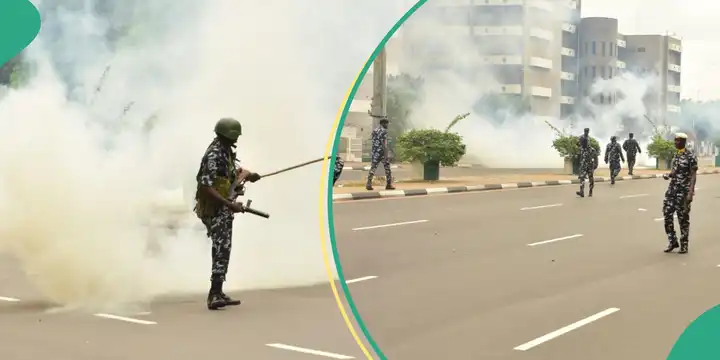In the face of police efforts to disperse the ongoing protests against economic hardship and poor governance in Nigeria, a defiant disabled man refused to leave Eagle Square in Abuja. The incident, which has been widely circulated on social media, highlights the determination of the protesters and the intensity of the current unrest.
On Friday, August 2, 2024, a video emerged showing a young disabled man bravely standing his ground as police fired multiple rounds of tear gas at protesters in Eagle Square. Despite the suffocating gas and the chaotic scene around him, the man remained resolute, stating in both English and Hausa that he would not go back home and was unafraid of any consequences. His actions and words echoed the sentiments of many Nigerians who feel marginalized and unheard by the government.
"I am not going back home," he declared. "President Bola Ahmed Tinubu must listen to the people."
The protests, part of a larger movement known as #EndBadGovernance, began as a response to the severe economic hardships faced by many Nigerians. The demonstrations, which have been dubbed the “#10daysofrage,” started peacefully but quickly escalated in some areas, leading to confrontations with security forces. In addition to economic grievances, the protesters are also calling for greater accountability and governance reforms.
The previous day, violence erupted in multiple states, including Kano, Gombe, Yobe, and Niger, resulting in the destruction of properties and clashes between protesters and the police. Reports indicate that in some instances, the police used live ammunition to disperse the crowds. This has led to increased tensions and a more determined stance from the protesters.
The police have been criticized for their heavy-handed response to the protests. Tear gas, water cannons, and rubber bullets have been employed in attempts to control the crowds. However, the determination of protesters like the disabled man at Eagle Square highlights the resilience and desperation of many Nigerians.
A nursing mother, whose husband was killed by bandits in Katsina State, also joined the protest, stating that the economic situation has made it impossible for her and many others to survive. "Nigerians are suffering and they cannot eat because there is economic hardship in the country," she said.
In Port Harcourt, the state capital of Rivers, protesters expressed their anger towards Governor Siminalayi Fubara, who attempted to placate them with money for water. The protesters rejected the offer, emphasizing that they wanted substantive changes rather than temporary relief.
The #EndBadGovernance protests have garnered significant attention both nationally and internationally. They highlight the widespread dissatisfaction with the current administration and the growing demand for systemic change. The refusal of the disabled man to back down, despite the physical risks, serves as a powerful symbol of the movement's resolve.
Political analysts suggest that the government's response to these protests could have long-term implications for its stability and legitimacy. The actions of security forces, particularly the use of tear gas and live ammunition, are being closely monitored by human rights organizations and the international community.
The Nigerian government, led by President Bola Ahmed Tinubu, has maintained that it respects the right to peaceful protest but will not tolerate violence and vandalism. In a statement, the president emphasized the need for dialogue and urged protesters to channel their grievances through appropriate legal means.
Despite these calls for calm, the protests show no sign of abating. Organizers have vowed to continue their demonstrations until tangible changes are made. The next few days will be crucial in determining the direction of the movement and the government's ability to address the underlying issues driving the protests.
The incident involving the defiant disabled man at Eagle Square is just one of many powerful moments in the ongoing #EndBadGovernance protests. As Nigerians continue to voice their frustrations and demand change, the government's response will be critical in shaping the future of the nation.
The situation remains fluid, and developments are expected to continue rapidly. For now, the resolve of the protesters and the heavy-handed tactics of the police have set the stage for a tense and potentially transformative period in Nigerian politics.










0 Comments
Post your comment here